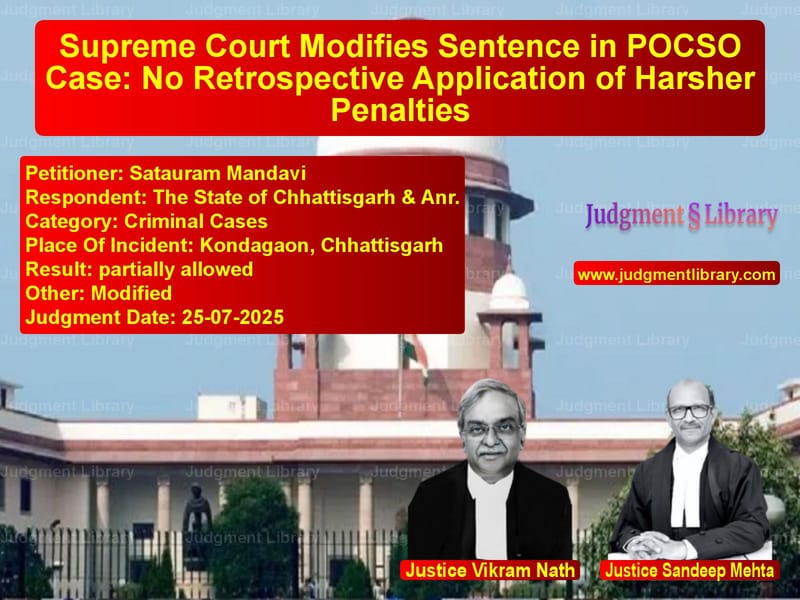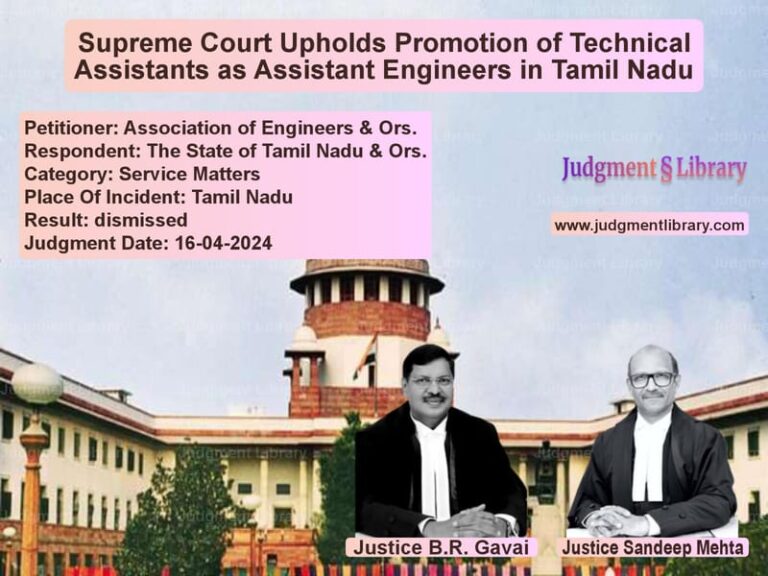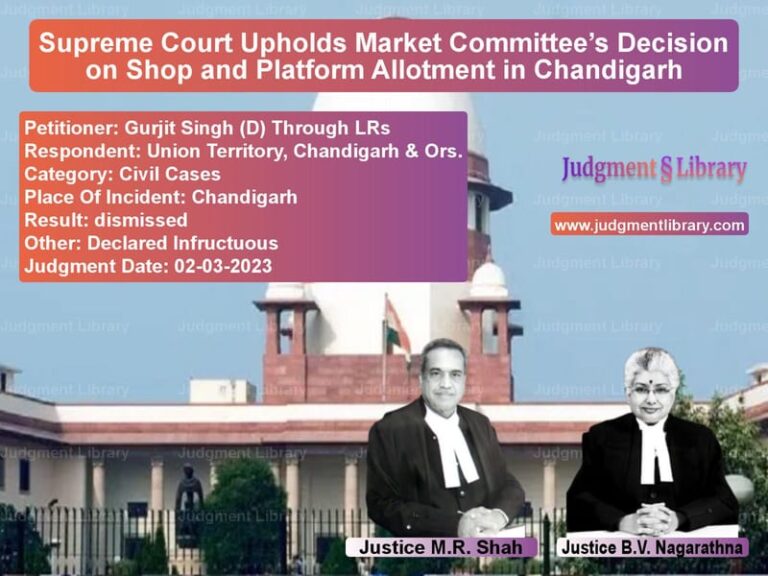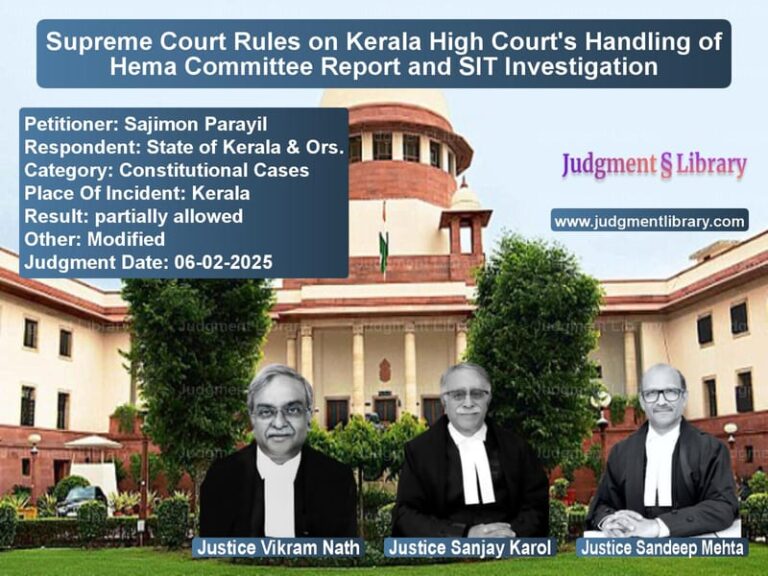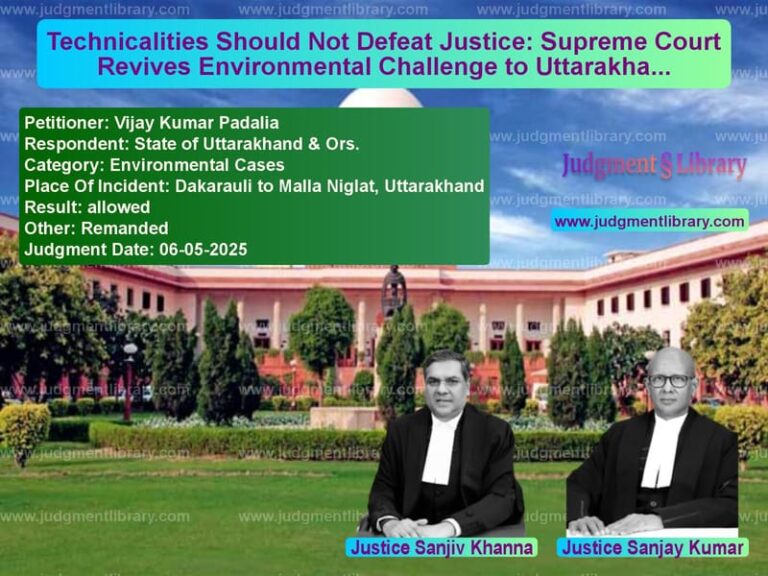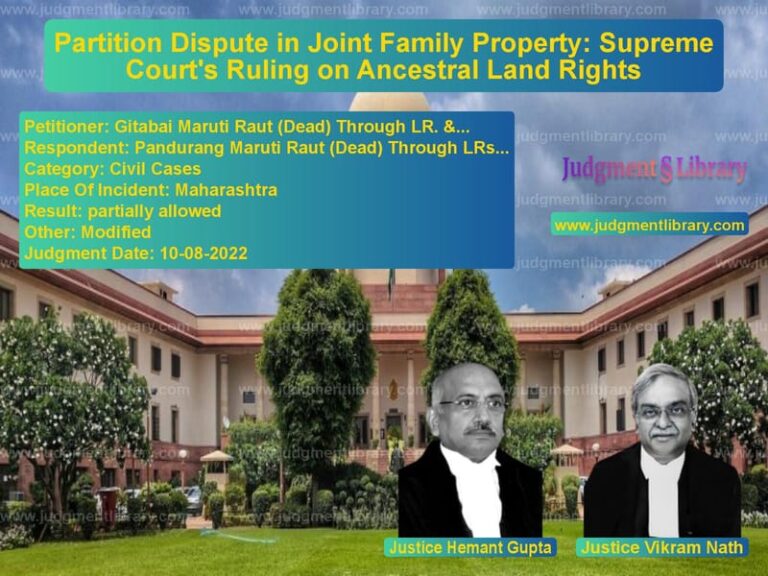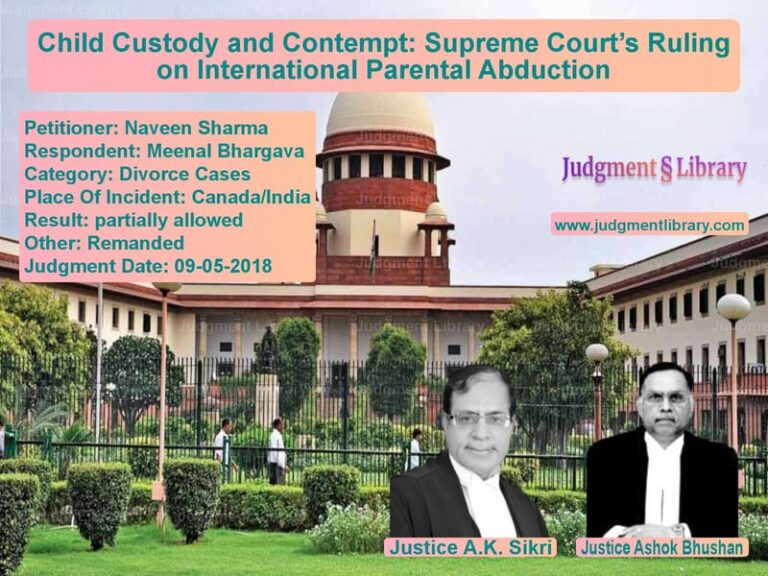Supreme Court Modifies Sentence in POCSO Case: No Retrospective Application of Harsher Penalties
In a significant judgment that underscores the fundamental constitutional protections available to every citizen, the Supreme Court of India recently modified the sentence of a convict in a POCSO case while upholding his conviction. The case of Satauram Mandavi versus The State of Chhattisgarh brings to light the crucial legal principle that harsher penalties cannot be applied retrospectively, even for the most heinous crimes. This judgment demonstrates how the Indian legal system carefully balances the need for stringent punishment for crimes against children with the fundamental rights guaranteed by the Constitution.
The case involves a horrific incident that occurred on May 20, 2019, in Kondagaon, Chhattisgarh. A five-year-old girl was playing outside her home while her parents and grandmother had gone to attend a marriage ceremony in the village. When the child’s mother returned and couldn’t find her daughter, she went to the appellant’s house and questioned him about the child’s whereabouts. Instead of providing answers, the appellant fled the scene, raising immediate suspicion. The father subsequently lodged an FIR alleging that the appellant had lured the minor girl to his house and committed rape upon her.
The Trial and Conviction
The trial court, after considering the oral and documentary evidence, recorded a categorical finding that the appellant had indeed lured the minor prosecutrix into his house and forcibly committed rape on her. The court convicted him under Section 376AB of the Indian Penal Code and Section 6 of the Protection of Children from Sexual Offences Act, 2012 (POCSO Act). The appellant was sentenced to imprisonment for life, meaning imprisonment for the remainder of his natural life, along with a fine of ₹10,000.
The High Court of Chhattisgarh, in its impugned judgment dated September 5, 2023, affirmed both the conviction and sentence. The High Court recorded that “no leniency could be shown in light of the fact that the victim was a five year old child and the crime committed was of a grave and heinous nature.” This reasoning reflected the judiciary’s appropriate concern for the vulnerability of child victims and the need for stern punishment in such cases.
The Legal Challenge
Aggrieved by the conviction and sentence, the appellant approached the Supreme Court. When the matter came before the Court, it found no merit in the challenge to conviction but saw substance in the argument regarding sentencing. The Supreme Court limited its examination to the question of sentence through its order dated September 30, 2024.
The core legal issue revolved around the application of the Protection of Children from Sexual Offences (Amendment) Act, 2019, which came into force on August 16, 2019. This amendment significantly enhanced the punishment for aggravated penetrative sexual assault under Section 6 of the POCSO Act. The appellant’s counsel argued that since the incident occurred on May 20, 2019 – before the amendment came into effect – the sentencing court had erred in applying the amended provisions retrospectively.
The State, opposing any modification in sentence, contended that “the appellant does not deserve any leniency considering the nature and gravity of the offence committed.” This argument highlighted the prosecution’s position that the severity of the crime warranted the harshest punishment available, regardless of technical legal considerations.
Read also: https://judgmentlibrary.com/cheque-bounce-case-jurisdiction-supreme-court-clarifies-legal-position/
The Legal Framework
To understand the Supreme Court’s decision, it’s essential to examine the legal provisions involved. Section 6 of the POCSO Act, prior to the 2019 amendment, read as follows: “6. Punishment for aggravated penetrative sexual assault – Whoever commits aggravated penetrative sexual assault shall be punished with rigorous imprisonment for a term which shall not be less than ten years but which may extend to imprisonment for life and shall also be liable to fine.”
The 2019 amendment significantly changed this provision by enhancing the minimum sentence to 20 years and redefining “imprisonment for life” to specifically mean imprisonment for the remainder of the natural life. This represented a substantial increase in the severity of punishment for the same offense.
Constitutional Protection Against Retrospective Penalties
The Supreme Court’s judgment centered on Article 20(1) of the Constitution of India, which provides a fundamental protection to all citizens. This crucial constitutional provision states: “20. Protection in respect of conviction for offences – (1) No person shall be convicted of any offence except for violation of a law in force at the time of the commission of the act charged as an offence, nor be subjected to a penalty greater than that which might have been inflicted under the law in force at the time of the commission of the offence.”
The Court emphasized that “The Constitutional bar against retrospective imposition of a harsher penalty under Article 20(1) is clear and absolute.” This principle is foundational to the rule of law – it ensures that citizens are governed by laws that exist at the time of their actions, not by laws that might be enacted later. The Court found that “The Trial Court, in applying the enhanced sentence introduced by the 2019 Amendment to Section 6 of the POCSO Act, has effectively subjected the appellant to a punishment greater than that which was permissible under the law in force at the time of commission of the offence which is clearly violative of the bar contained in Article 20(1) of the Constitution of India.”
The Supreme Court’s Ruling
The Supreme Court made a clear distinction between upholding the conviction and modifying the sentence. The Court stated: “The sentence of ‘imprisonment for life, meaning remainder of natural life,’ as per the amended provision, did not exist in the statutory framework on 20.05.2019, the date of the incident. Under the unamended Section 6, the maximum punishment permissible was imprisonment for life in its conventional sense and not imprisonment till the remainder of natural life.”
This distinction is legally significant. “Imprisonment for life” in its conventional sense, as understood under Indian law, means imprisonment for the convict’s natural life, but with the possibility of remission or premature release under certain circumstances. However, “imprisonment for the remainder of natural life” specifically eliminates any possibility of remission or early release, ensuring the convict remains in prison until death.
Accordingly, while the Supreme Court upheld the conviction of the appellant under Section 6 of the POCSO Act, it modified the sentence to that of rigorous imprisonment for life, as understood under the unamended statute, and set aside the sentence of imprisonment for the remainder of the natural life. The fine of ₹10,000 was maintained.
Broader Implications
This judgment has significant implications for the Indian criminal justice system. First, it reaffirms the supremacy of constitutional protections over statutory provisions. Even when dealing with the most reprehensible crimes, the courts must adhere to fundamental rights guaranteed by the Constitution.
Second, the judgment highlights the importance of temporal application of laws. Legislatures may enhance punishments for crimes in response to societal concerns, but these enhanced punishments can only apply to offenses committed after the new law comes into force. This principle provides certainty and predictability in the legal system.
Third, the decision demonstrates the judiciary’s role in maintaining a balance between the interests of victims and the rights of the accused. While the Court acknowledged the heinous nature of the crime, it also recognized that constitutional protections cannot be compromised, even for the most morally reprehensible conduct.
The judgment also serves as an important reminder to trial courts and high courts about the careful application of sentencing laws. Courts must be vigilant about the date of commission of offenses and the laws in force at that time when imposing sentences.
This case represents the delicate balance that courts must maintain between the legitimate societal interest in punishing criminals severely and the constitutional protections that form the bedrock of our legal system. While the appellant’s conviction stands, the modification of his sentence reaffirms that in India, even those accused of the most serious crimes are entitled to the protection of fundamental rights, and that the rule of law prevails over emotional considerations, however compelling they might be.
The Supreme Court’s decision in Satauram Mandavi’s case thus stands as an important precedent, reinforcing that constitutional principles cannot be diluted, even when dealing with crimes that shock the collective conscience of society.
Petitioner Name: Satauram Mandavi.Respondent Name: The State of Chhattisgarh & Anr..Judgment By: Justice Vikram Nath, Justice Sandeep Mehta.Place Of Incident: Kondagaon, Chhattisgarh.Judgment Date: 25-07-2025.Result: partially allowed.
Don’t miss out on the full details! Download the complete judgment in PDF format below and gain valuable insights instantly!
Download Judgment: satauram-mandavi-vs-the-state-of-chhatti-supreme-court-of-india-judgment-dated-25-07-2025.pdf
Directly Download Judgment: Directly download this Judgment
See all petitions in Rape Cases
See all petitions in Juvenile Justice
See all petitions in Bail and Anticipatory Bail
See all petitions in Custodial Deaths and Police Misconduct
See all petitions in Constitution Interpretation
See all petitions in Judgment by Vikram Nath
See all petitions in Judgment by Sandeep Mehta
See all petitions in partially allowed
See all petitions in Modified
See all petitions in supreme court of India judgments July 2025
See all petitions in 2025 judgments
See all posts in Criminal Cases Category
See all allowed petitions in Criminal Cases Category
See all Dismissed petitions in Criminal Cases Category
See all partially allowed petitions in Criminal Cases Category

